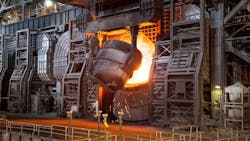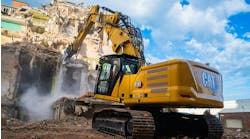Water-Glycol Hydraulic Fluids: More Than a “Green” Solution
Hydraulic fluid is the lifeblood of industrial machinery and serves many purposes in industry applications. With advances in equipment technology and the ability for hydraulic fluids to provide the necessary protection, it is essential to understand that it is not just another consumable item to be purchased and disposed of as needed.
Many in the industry now recognize that selecting the proper hydraulic fluid can contribute to plant efficiency and ultimately help reduce costs. This insight has driven a great deal of innovation in the hydraulic fluid market. It has brought more choices to power transmission plants, steel and aluminum mills, and other facilities that rely on hydraulic fluids.
The versatility of the water-glycol hydraulic fluids allows those fluids to be applied in many applications. Today, water-glycol hydraulic fluids can be used in many applications that previously called for mineral oil-based fluids where fire resistance is required. Identifying the need for a fire-resistant fluid and understanding the lubrication requirements is the first step in realizing the benefits that water-glycol hydraulic fluids can bring to various industries.
Development of Water-Glycol Based Hydraulic Fluids
Water-glycol based hydraulic fluids were first introduced as a solution to onboard fire problems during World War II. The U.S. Navy discovered that mineral oils were not fire-resistant enough to survive the rigors of combat and subsequently initiated a program to create fire-resistant hydraulic fluids.
That program led to the development of water-glycol hydraulic fluids, which proved to be both fire-resistant and were able to meet the rigorous needs of the Navy. Water-glycol hydraulic fluids were commercialized in 1947 and offered vastly improved fire resistance relative to mineral oils in use at the time.
Since 1947, water-glycol based hydraulic fluids have undergone additional research and formulation changes. Water glycol formulations that extend service life, reduce wear, lower operating costs and are environmentally acceptable are now increasingly available. Water-glycol hydraulic fluids have evolved to the point where they offer reduced operating expenses, safe operating environments and excellent economies of scale.
Many industries utilize water-glycol hydraulic fluids, including power transmission plants; hydraulics systems operating in areas subject to fire hazards (such as those in steel and aluminum mills); molding and metal die casting machinery; welding machines; and foundries. The fluids can also be used in cases that can benefit from fire resistance and extended fluid life while also meeting environmental concerns.
Water-Glycol Hydraulic Fluid Basics
As the name implies, water-glycol fluids consist of a solution of water, ethylene or diethylene glycol, a thickener and an additive package. The additive system contains attributes such as wear protection corrosion resistance, metal passivation, oxidation resistance, antimicrobial properties, and a pink or red dye to aid in identification.
The development of water-glycol hydraulic fluids has been driven by a multitude of changes impacting various industries. A prime example is environmental concerns that have driven industries to look for fluids that are less harmful to the environment, more easily cleaned up and also biodegradable.
Fire safety is another critical area. Water-glycol fluids are fire-resistant, and as industries move to higher operating pressures, the risk of fire increases from ruptured lines. In addition, concerns around equipment life spans, service intervals, and targets focusing on reducing the total cost of ownership are prompting industries to embrace the latest technologies around water-glycol fluids. They are often given strong consideration when facilities are looking to upgrade their hydraulic fluids.
The Benefits of Water-Glycol Hydraulic Fluids
Water-based hydraulic systems have been traditionally used in underground mining applications and in steel mills and foundries, where the obvious advantage offered were fire resistance. Further development of the fluids led to use by the Navy in other hydraulic systems, where the importance of fire resistance had been stressed even more. However, pure or deionized water was not suitable for many use cases since corrosion and wear protection become an additional concern.
As new formulations were introduced, with the inclusion of glycol and additive packages, anti-wear and anti-corrosion capabilities were incorporated into the fluid. The creation of non-toxic, biodegradable formulas also helps create an environmentally acceptable hydraulic fluid. Water-glycol hydraulic fluids bring many advantages to the industry. Some that may not be readily apparent include:
Lower clean-up costs. Water-based hydraulic systems hold the potential for tremendous cost savings at the plant and applicant site due to lower associated clean-up costs.
Safety. Many water-glycols are certified as FM Approved for fire resistance. Water-glycol hydraulic fluids are classified as HFC fire-resistant fluids and can reduce fire hazards in storage, handling and use.
Wear protection. Water-glycol hydraulic fluids can have higher viscosity indices than any other fire-resistant fluids for a given viscosity grade providing excellent hydrodynamic lubrication in a wider operating temperature window. Together with advanced additive technology, wear protection is amply provided over the entire lubrication regime.
Rust and corrosion protection. Water-glycol hydraulic fluids can be formulated with several corrosion inhibitors, including liquid phase rust protection, vapor phase rust protection and liquid phase yellow metal passivation. For example, Shell Water-Glycol hydraulic fluids pass the rust corrosion test ASTM D 665 A (freshwater) and D665 B (saltwater) at 24-hour duration and ASTM D 130 copper corrosion test strip with ratings of 1a or 1b.
Predictable service life. Water-glycol hydraulic fluid formulations can be readily tested and monitored to measure fluid life, giving operators insight into when a replacement may be needed.
Excellent fire resistance coupled with reasonable cost and performance makes water-glycol fluids a good choice for many industrial applications.
Considerations and Recommendations
Interest in water-based fluids has been driven both by HSE and economic considerations. However, different rules apply to water-based hydraulic systems. Care should be taken when converting from a mineral oil to a water-based or synthetic anhydrous fluid.
Operators cannot simply drain a mineral oil-based hydraulic system and replace the fluid with a water-glycol formulation. Water-glycol formulations are not compatible with mineral oil formulations and mixing the two might result in deposits that may be difficult to remove. Follow change out guidelines provided by your lubricant supplier.
Other issues to evaluate when considering switching to water-glycol hydraulic fluids include temperature sensitivity and possible evaporation. Since water-glycols contain water, higher system temperatures may cause water to evaporate from the fluid. This can impact the heat transfer properties of the fluids as well as the lubrication. Your lubricant supplier can provide guidance on how to measure the water content (generally by viscosity measurement or with a handheld refractometer) and advise on adding deionized water to restore the fluid to the correct concentration.
Special consideration should also be given to seals, gaskets and connectors to make sure they are compatible with the formulation and will not deteriorate. Certain metals such as zinc and cadmium may be especially sensitive to water glycol formulations, and exposure to such formulations might result in rapid fluid deterioration.
Water-glycol hydraulic fluids are emerging as the first choice in hydraulic fluid for many industries. Although existing systems may require retrofitting, the long-term savings offered by water-glycol hydraulic fluids could help reduce the total cost of ownership and can bring forth a measurable return on investment in extended service life, reduced environmental costs and an overall reduction in operating costs.
Robert Profilet, Ph.D.. is technical manager, Iris Song, Ph.D. is an engineer and Sameer Sathaye, Ph.D. is project leader for industrial oils, all with Shell Global Solutions U.S.



